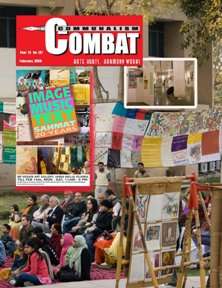Communalism Combat
Communalism Combat is a monthly magazine published by Sabrang Communications since August 1993.[1] The magazine is edited by husband wife team of Javed Anand and Teesta Setalvad.[2]
 | |
| Editor | Javed Anand and Teesta Setalvad |
|---|---|
| Categories | Human rights |
| Frequency | Monthly |
| Publisher | Sabrang Communications |
| First issue | 1993 |
| Country | India |
| Language | English |
| Website | http://www.sabrang.com/ |
| OCLC | 36621054 |
History
Javed Anand and Teesta Setalvad left their jobs as Bombay-based journalists in the mainstream press and founded Communalism Combat in 1993 to fight religious intolerance and communal violence.[3] Their decision followed the December 1992 destruction of the Babri Mosque in Ayodhya by Hindu fundamentalists.[4] Communalism Combat first appeared in August 1993.[5]
Funding
In a 1999 interview, Javed Anand said that before the 1999 Lok Sabha elections Communalism Combat requested and received funds from the Congress Party, Communist Party of India (Marxist) and the Communist Party of India and ten individuals to run advertisements attacking the Sangh Parivar and the Bharatiya Janata Party (BJP). The total budget for this campaign was 15 million rupees, and eighteen ads appeared in 16-18 publications in English, Hindi and other Indian regional languages across India. Some other papers, such as Meerut-e-Samachari and The Asian Age, saw the ads and reprinted them at no cost. One of the ads, attacking the Sangh Parivar's attitude towards women, was endorsed by thirteen NGOs. They received notices from the government pointing out that it was illegal for NGOs that received foreign funding to intervene in politics.[6]
According to Javed Anand, as of 2003 the Air Freight company had supported Communalism Combat for 10 years by buying advertising space in the magazine. The only other advertiser was the Madhya Pradesh government. The Tatas had regularly advertised in the newspaper, but had stopped when the BJP government came into power. The newspaper had been accused of illegally accepting funding from abroad, but this was not substantiated.[7]
Content and editorial policy
The magazine discusses the activities of both minority and majority communal political parties. It also publishes personal accounts from individuals who are involved in the struggle against divisive forces both within and without India.[8] Javed Anand has said, "Communalism Combat is a vehicle through which we try to combat communal conflict. Both minority and majority right-wing."[6] In a 2003 interview by Jyoti Punwani, published in The Hoot magazine, when asked "How do you resolve the age-old debate between objective and activist journalism?" Javed Anand replied,
"There can be nothing like taking an objective stand between secularism and fascism. That’s bull-shit."[7]
He went on to say,
Frankly it’s not our concern to establish our "credibility" as journalists to fascists. When we feel the need, we approach them. We have sent faxes to L K Advani and had he replied, we would have published his replies. But we don't want to appear objective just to get Bal Thackeray to talk to us.[7]
Recognition
The Magazine won a Prince Claus Award in 2000. The award citation said "The independent magazine Communalism Combat (founded in 1992, Bombay, India) opposes ethnic fundamentalism and separatism in Indian culture, also in the diaspora. It creates a space for freedom: a platform for the discussion of current and often controversial issues...".[9]
The Milli Gazette described Communalism Combat's special issue on the genocide in Gujarat as "Superb". This issue attempted to collect all possible information on the event including official statements and eyewitness accounts. It covered the role of officials and politicians in the riots, the destruction caused and the way in which regional media stirred up anger.[10]
References
- About Us.
- Kapoor 1995, p. 11.
- Varma 2012.
- Albert 2000, p. 113.
- Peer 2007, p. 229.
- Pestonji 1999.
- Punwani 2003.
- Rhinoceros.
- Prince Claus.
- Milli Gazette.
- Sources
- "About Us". Sabrang Communications. Archived from the original on 28 March 2012. Retrieved 20 March 2012.
- Albert, Odile (2000). Se former à l'interculturel: expériences et propositions (in French). ECLM. ISBN 2843770238.CS1 maint: ref=harv (link)
- Kapoor, Harsh (April 1995). "Resources Against Communalism and Religious Fundamentalism in India". Retrieved 20 March 2012.CS1 maint: ref=harv (link)
- The Milli Gazette. "Communalism Combat". 3 (10). Retrieved 22 March 2012. Cite journal requires
|journal=(help) - Peer, Yasmeen (2007). Communal violence in Gujarat: Rethinking the role of communalism and institutionalized injustices in India. ProQuest. ISBN 0549517537.CS1 maint: ref=harv (link)
- Pestonji, Meher (1999). "Anyone involved in secular action is going to be targeted". Humanscape India. Archived from the original on 17 December 2002. Retrieved 22 August 2012.CS1 maint: ref=harv (link)
- The Prince Claus Fund. "Communalism Combat (India)". Retrieved 22 March 2012.
- Punwani, Jyoti (1 September 2003). "An activist magazine completes a decade". The Hoot. Archived from the original on 27 September 2007.CS1 maint: ref=harv (link)
- Rhinoceros (21 December 2007). "Communalism Combat". Archived from the original on 24 April 2013. Retrieved 22 March 2012.
- Varma, Anuradha (4 March 2012). "Meet the husbands: Javed Anand, journalist-activist". The Times of India. Retrieved 21 March 2012.CS1 maint: ref=harv (link)